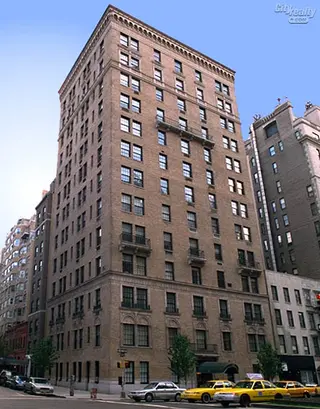 Carter Horsley
Carter HorsleyDec 23, 2011
Carter's Review
This understated but grand apartment building at 635 Park Avenue on the southeast corner at 66th Street was erected in 1912 and converted to a cooperative in 1946.
It was designed by J. E. R. Carpenter, the leading architect of luxury apartment buildings in the city of his generation, for Spencer Fullerton Weaver, who was also the developer of 630 and 640 Park Avenue.
Mr. Carpenter’s other Park Avenue buildings include 550, 580, 625, 630, 640, 655, 812, 950, 960 and 1050. His Fifth Avenue buildings include 810, 825, 907, 920, 950, 988, 1030, 1035, 1060, 1115, 1120, 1143, 1150, 1165 and 1170 as well as 2 East 66th Street.
The 13-story apartment building has only 16 apartments.
Bottom Line
Its rather sober but elegant appearance belies the spectacular layouts of this pre-war building in prime Park Avenue territory.
Description
The building has a finely detailed, light-brown brick façade in Italian-Renaissance-palazzo style.
It has a canopied entrance with sidewalk landscaping. The second-floor windows have lunette decorative panels above them and there is a broad bandcourse above the third floor and a balustrade bandcourse at the 12th floor.
The building has a very detailed cornice with many arches, multi-paned windows and some discrete air-conditioners.
Amenities
The building has a doorman, an elevator operator, a live-in superintendent and storage.
Apartments
Most of the units have very spectacular layouts with a circular foyer 13-and-half feet in diameter, a 30-foot-long living room, a 27-foot-long dining room and a 18-foot-long salon.
In an October 6, 1977 article in The New York Times, Paul Goldberger listed the building as one of the city’s “Top 10: Great City Apartment Buildings.” “This building,” he wrote, “is not more than decent on the outside – a solid, unprepossessing brick structure that does a good job of providing one segment of he even ‘street wall’ that makes upper Park Avenue significant. What makes 635 Park Avenue special are the floor plans of its 12 apartments, one to a floor - which, as Andrew Alpern pointed out in “Apartments for the Affluent,’ are skillfully divided into public, private and service areas. One enters through a bond foyer, and moves to a living room, dining room and library. A corridor off the foyer leads to four master bedrooms, the kitchen, pantry and four maid’s rooms are tucked neatly away in the back.”
In an April 3, 1980 article in The Times, Paul Goldberger, wrote that “J. E. R. Carpenter produced two of the best floor plans in Manhattan for 635 Park Avenue and 580 Park Avenue, where the rooms are arranged around a circular central foyer,” adding that “The round foyer recalls the serene and handsome entry spaces in many of the great beaux arts town houses, and is a reminder the goal of many architects in the 20s was to create the ambiance of a town house.”
History
It replaced an apartment house known as the Adelaide that had been designed by Henry J. Hardenbergh, the architect of the Dakota at 1 West 72nd Street and the Plaza Hotel.
One of its former residents was Harriet Barnes Pratt, the widow of Harold Irving Pratt, the youngest of six sons of Charles Pratt, the founder of Pratt Institute and a founder of the Standard Oil Company. Mrs. Pratt was a nationally known horticulturatist and philanthropist who died in 1969.
Another resident was Walter Hoving, the head of Tiffany's.
Another resident was Lord Conrad Black, a former publishing magnate whose company, Hollinger International, owned the Daily Telegraph, the Chicago Sun-Times among many others. He resigned by Hollinger in 2003 and was convicted for mail fraud several years later. The company bought him an apartment at 635 Park Avenue for $3 million in 1994 and he brought from Hollinger in 2000 and several years later tried to sell it through brokers at Sotheby’s that led to a legal fight over commissions.
Location
The building is across the side-street from the battlements of the impressive 7th Regiment Armory building that was erected in 1880. The armory, which was designed by Charles W. Clinton, is home now to the First Battalion, 107th Infantry, New York Army National Guard and traces its history to the 7th Regiment that was formed in 1906 and how been located on the Bowery between 6th and 7th Streets. It has impressive interiors and is the scene of many important art and antiques shows.
This area of Park Avenue is very desirable because of its proximity to midtown, many religious institutions and clubs, fashionable boutiques and restaurants and excellent public transportation. Cross-town bus service and a local subway station are very close.

- Co-op built in 1914
- 1 apartment currently for sale ($9.5M)
- Located in Park/Fifth Ave. to 79th St.
- 16 total apartments 16 total apartments
- 9 recent sales ($1.3M to $11.1M)
- Doorman

 6sqft delivers the latest on real estate, architecture, and design, straight from New York City.
6sqft delivers the latest on real estate, architecture, and design, straight from New York City.
